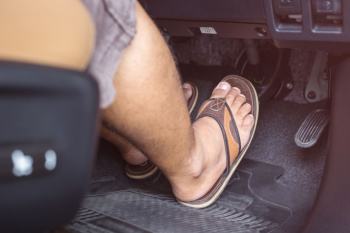
Driving in flip-flops can lead to various types of foot pain and discomfort. The flimsy, open design of flip-flops offers little support or stability, causing the foot to shift and slide on the pedal. This instability can strain the muscles and tendons in the foot, leading to soreness or even injury. The lack of cushioning and shock absorption in flip-flops may exacerbate pressure on the feet during long drives, resulting in discomfort or pain. Additionally, frequent friction between the flip-flop and the foot can contribute to blisters and calluses. To avoid these issues, it is advisable to wear supportive, closed-toe shoes while driving. Wearing proper footwear ensures better control of the vehicle and helps prevent foot pain associated with inadequate support and protection. If you have developed foot discomfort from wearing flip-flops while driving or completing daily activities, it is suggested that you consult a podiatrist who can treat foot pain, and guide you on wearing more appropriate shoes.
Flip-flops can cause a lot of problems for your feet. If you have any concerns about your feet or ankles, contact one of our podiatrists from Foot and Ankle Center. Our doctors will assist you with all of your foot and ankle needs.
Flip-Flops and Feet
Flip-flops have managed to become a summer essential for a lot of people. While the shoes may be stylish and easy to slip on and off, they can be dangerous to those who wear them too often. These shoes might protect you from fungal infections such as athlete’s foot, but they can also give you foot pain and sprained ankles if you trip while wearing them.
When Are They Okay to Wear?
Flip-flops should only be worn for very short periods of time. They can help protect your feet in places that are crawling with fungi, such as gym locker rooms. Athlete’s foot and plantar warts are two common fungi that flip-flops may help protect your feet against.
Why Are They Bad for My Feet?
These shoes do not offer any arch support, so they are not ideal for everyday use. They also do not provide shock absorption or heel cushioning which can be problematic for your feet. Additionally, you may suffer from glass cuts, puncture wounds, and stubbed toes since they offer little protection for your feet.
More Reasons Why They Are Bad for Your Feet
- They Slow You Down
- May Cause Blisters and Calluses
- Expose Your Feet to Bacteria
If you have any questions, please feel free to contact our office located in Egg Harbor Township, NJ . We offer the newest diagnostic and treatment technologies for all your foot care needs.
